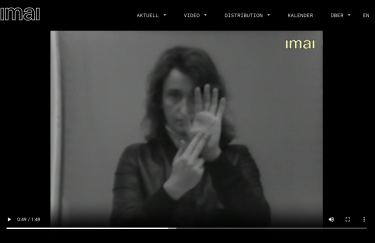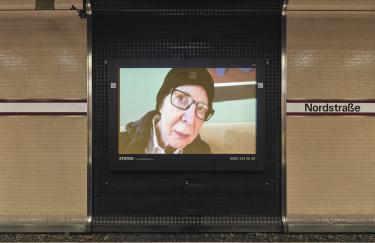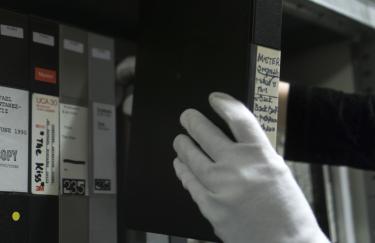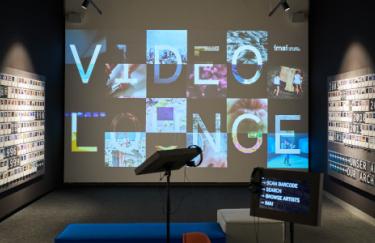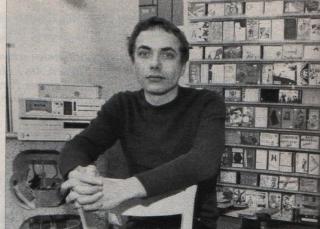
We mourn the loss of Axel Wirths
(1960-2025)
Typ
AnnouncementDate
24.02.2025It is with great sadness that we bid farewell to Axel Wirths, co-founder and long-term board member of the IMAI - Inter Media Art Institute. Together with Ulrich Leistner, he established the IMAI foundation in 2006 to help video and media art achieve greater acceptance, sustainability, and accessibility. With his profound knowledge of media art, his enormous network of artists, his visionary impulses and, last but not least, his power of persuasion, he ensured that IMAI was established as a unique institution in Germany for the mediation, dissemination and distribution of audiovisual art.
As early as 1982, Axel Wirths and Ulrich Leistner founded the distribution agency 235 Video, which has been known as the media art agency 235 Media in Cologne since the 1990s. At a time when video art was still on the fringes of the established art scene, Axel Wirths advocated innovative distribution structures that took into account the reproducibility of the media and supported the economic interests of the artists. It was crucial for him that media art could become marketable on the art market by taking its specific characteristics into account. It was also important to him to make this art form accessible to a broad audience, to “socialize” it - as he once called it - and to use all conceivable meeting spaces, not only museums, but initially also clubs and festivals and later television and the Internet. His involvement in all these areas helped to promote video as a means of artistic expression in exhibition institutions and to advance its recognition on the art market.
Axel Wirths knew how to promote new developments in video art in close collaboration with artists - be it through innovative distribution structures, technical support, or the organization of presentation opportunities. He was both an enthusiastic mediator and an active contributor to video and media art in Germany and around the world. He was co-initiator of the association Media Art Produktionen e.V., founded in 1988, and co-author of the television magazine “Donnerstag”, which broadcast video art in 1990. In 1992, Axel Wirths was appointed director of the 5th Videonale. In the same year, he was instrumental in exhibiting the “Electronic Café International” in the specially designed Casino Container at documenta 9 in Kassel and a year later at the Venice Biennale and in Cologne's Medienpark. From 1993 to 1999, Axel Wirths was responsible for the program of the MedienKunstRaum at the Bundeskunsthalle Bonn, where he realized over twenty exhibitions with international media artists. In 2000, he curated the impressive exhibition “vision.ruhr” with mainly interactive installations at the Zeche Zollern II/IV in Dortmund.
Early on, Axel Wirths sensitized museums and institutions to the need for careful and continuous conservation of media art. It is thanks to him and Ulrich Leistner that the core holdings of the IMAI foundation were digitized as early as the beginning of the 2000s and an online video platform was set up already in 2005 - measures that are now standard practice. For him, issues and strategies relating to the conservation and restoration of technology-based art were therefore foresightedly one of the foundation's central tasks. Axel Wirths was a pioneer not only in the North Rhine-Westphalian media art landscape, but far beyond it. In Axel Wirths, we have lost a benevolent mentor and valued companion whose vision and commitment will be greatly missed. His legacy will remain alive: in the works he made possible and preserved, in the networks he established and, last but not least, in the presence of the IMAI foundation.
Rajiv Strauß (Board),
Reiner Nachtwey (Board),
Linnea Semmerling (Director since 2020),
Renate Buschmann (Director 2008-2019),
Darija Šimunović (Research Associate),
Jonathan Rösen (Freelance Digital Collections)
![Seo Hye Lee, [sound of day turning to night], 2026 Eine urbane Straße in der Dämmerung. Links und rechts umgeben von hohen Gebäuden. Mehrere rote Ampeln und leuchtende Straßenlaternen ziehen sich entlang der Straße, dazu die Scheinwerfer vorbeifahrender Autos. Unten leuchtet der Himmel in Orange, während er nach oben hin ins Blau übergeht. Am unteren Bildrand erscheint in gelber Schrift die Texteinblendung [sound of day turning to night].](/sites/default/files/styles/custom_mobile_crop/public/media/images/2026-01/SHL-ORIGINAL.jpg?h=0f9a3e00&itok=oKD0oRye)

